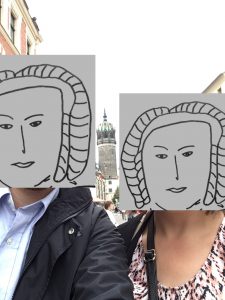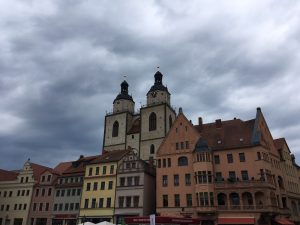He was a monk who stood up to the Roman Catholic church, a writer at the top of the European publishing industry, and a leader who changed the course of world history. And all those achievements sometimes make people forget that Martin Luther also was a musician and a beer connoisseur.
In a letter dated October 31, 1517, Luther sent the Archbishop of Mainz a list of 95 theses against what he perceived as abuses in the Church. That same day or soon afterwards, he may have posted a set of the theses on the door of the Castle Church in Wittenberg. For these reasons, many Protestant Christian churches celebrate October 31 as Reformation Day. In commemoration of the 500th anniversary of Luther’s important theses, BachBeer will be publishing several posts on Luther and his relevance to music and beer.

Luther’s main legacy as a composer is his collection of chorales, which are songs for congregational singing. Luther wanted worshippers to understand the ideas in these chorales, so he wrote the words in the vernacular German, not the ecclesiastical Latin of the Roman Catholic church. He also wrote the tunes for some of the chorales, including the most famous one, “Ein feste Burg ist unser Gott (A Mighty Fortress Is Our God).” Listen to that chorale sung in the home church of our namesake here:
https://www.youtube.com/watch?v=MEnMe1tDxic
Many people know, and even sing, the Lutheran chorales. But few people also know that Martin Luther had strong feelings and interesting ideas about beer. These ideas don’t make it into popular history books; they are hidden in libraries, tucked away in complete collections of Luther’s sermons and notes about his table talk.
On March 10, 1522, Luther preached a sermon in Wittenberg, in which he praised compassion and encouraged listeners not to use violence against their opponents. He gave himself as an example: “I opposed indulgences and all the papists, but never with force. I simply taught, preached, and wrote God’s Word; otherwise, I did nothing.” He then claimed that the Word had devastated his enemies while he slept “or drank Wittenberg beer with [his] friends.”

Even readers with no interest in spreading God’s Word can find timeless wisdom in Luther’s sermon. A master marketer, Luther understood that nobody can force another person to accept an idea. Instead, the best advocates spread their messages widely in a variety of media—in Luther’s case, teaching, preaching, and writing—and wait while their ideas take seed in the minds of their audience. And when Luther mentions his city’s brewing industry by referring to “Wittenberg beer,” he seems to suggest that one of the best ways to pass the time after work is to share a local beer with friends. We feel the same way.
The next time someone says that the Reformation opened the door for modern culture, remember how Luther’s ideas anticipated the happy hour and craft brewing. After 500 years, those ideas are still fresh and worth sharing with friends.